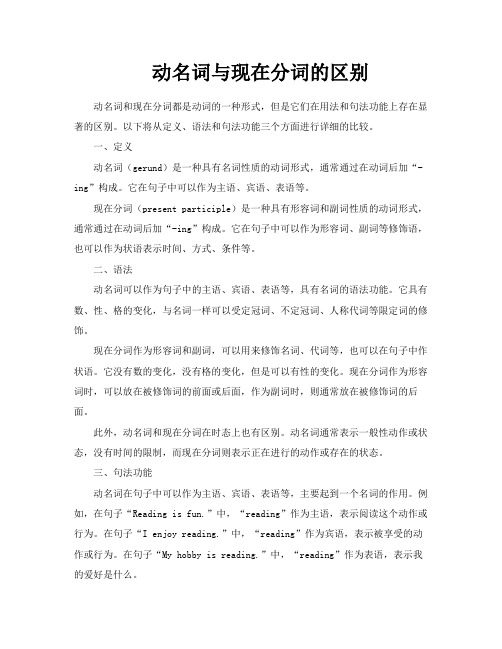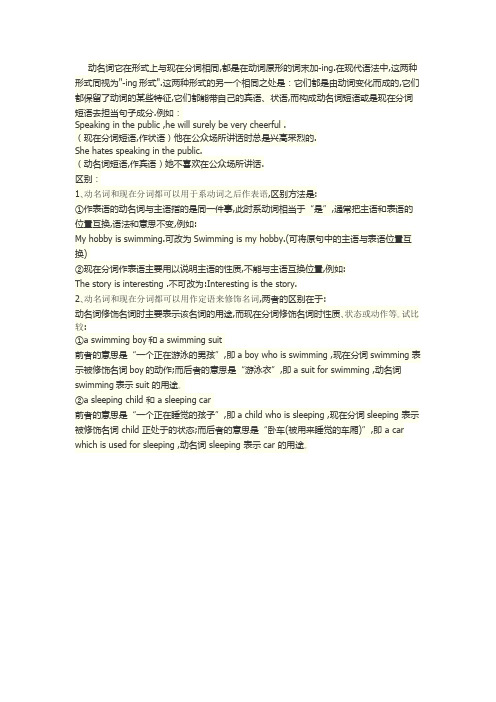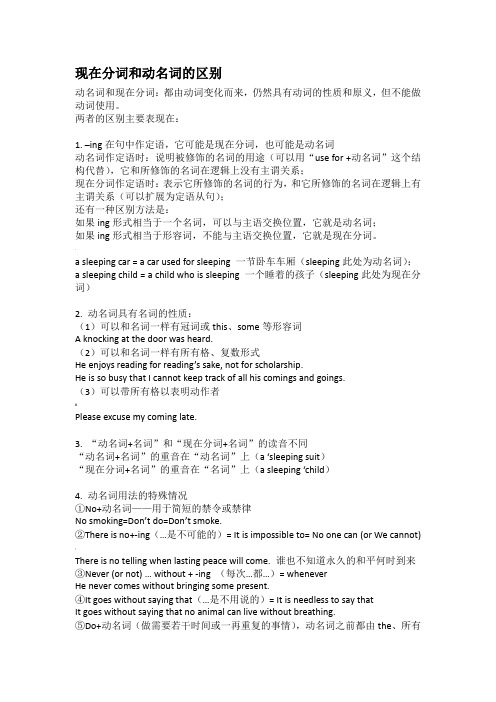现在分词与动名词
动名词与现在分词的区别

动名词与现在分词的区别动名词和现在分词都是动词的一种形式,但是它们在用法和句法功能上存在显著的区别。
以下将从定义、语法和句法功能三个方面进行详细的比较。
一、定义动名词(gerund)是一种具有名词性质的动词形式,通常通过在动词后加“-ing”构成。
它在句子中可以作为主语、宾语、表语等。
现在分词(present participle)是一种具有形容词和副词性质的动词形式,通常通过在动词后加“-ing”构成。
它在句子中可以作为形容词、副词等修饰语,也可以作为状语表示时间、方式、条件等。
二、语法动名词可以作为句子中的主语、宾语、表语等,具有名词的语法功能。
它具有数、性、格的变化,与名词一样可以受定冠词、不定冠词、人称代词等限定词的修饰。
现在分词作为形容词和副词,可以用来修饰名词、代词等,也可以在句子中作状语。
它没有数的变化,没有格的变化,但是可以有性的变化。
现在分词作为形容词时,可以放在被修饰词的前面或后面,作为副词时,则通常放在被修饰词的后面。
此外,动名词和现在分词在时态上也有区别。
动名词通常表示一般性动作或状态,没有时间的限制,而现在分词则表示正在进行的动作或存在的状态。
三、句法功能动名词在句子中可以作为主语、宾语、表语等,主要起到一个名词的作用。
例如,在句子“Reading is fun.”中,“reading”作为主语,表示阅读这个动作或行为。
在句子“I enjoy reading.”中,“reading”作为宾语,表示被享受的动作或行为。
在句子“My hobby is reading.”中,“reading”作为表语,表示我的爱好是什么。
现在分词在句子中主要作为形容词、副词等修饰语,起到一个修饰、描述或说明的作用。
例如,在句子“The dog is running after the ball.”中,“running”作为现在分词作形容词,描述了“dog”的状态。
在句子“While I was reading, she came in.”中,“reading”作为现在分词作状语,表示我正在进行的动作。
动名词和现在分词的区别

动名词它在形式上与现在分词相同,都是在动词原形的词末加-ing.在现代语法中,这两种形式同视为"-ing形式".这两种形式的另一个相同之处是:它们都是由动词变化而成的,它们都保留了动词的某些特征,它们都能带自己的宾语、状语,而构成动名词短语或是现在分词短语去担当句子成分.例如:Speaking in the public ,he will surely be very cheerful .(现在分词短语,作状语)他在公众场所讲话时总是兴高采烈的.She hates speaking in the public.(动名词短语,作宾语)她不喜欢在公众场所讲话.区别:1、动名词和现在分词都可以用于系动词之后作表语,区别方法是:①作表语的动名词与主语指的是同一件事,此时系动词相当于“是”,通常把主语和表语的位置互换,语法和意思不变,例如:My hobby is swimming.可改为Swimming is my hobby.(可将原句中的主语与表语位置互换)②现在分词作表语主要用以说明主语的性质,不能与主语互换位置,例如:The story is interesting .不可改为:Interesting is the story.2、动名词和现在分词都可以用作定语来修饰名词,两者的区别在于:动名词修饰名词时主要表示该名词的用途,而现在分词修饰名词时性质、状态或动作等。试比较:①a swimming boy和a swimming suit前者的意思是“一个正在游泳的男孩”,即a boy who is swimming ,现在分词swimming 表示被修饰名词boy的动作;而后者的意思是“游泳衣”,即a suit for swimming ,动名词swimming表示suit 的用途。②a sleeping child 和 a sleeping car前者的意思是“一个正在睡觉的孩子”,即a child who is sleeping ,现在分词sleeping 表示被修饰名词 child 正处于的状态;而后者的意思是“卧车(被用来睡觉的车厢)”,即 a car which is used for sleeping ,动名词 sleeping 表示car 的用途。。
动名词和现在分词的区别

• 在英语中,现在分词与动名词除了单独使用之外(比如上 面两个例句),通常还可以引导一个短语,此时的现在分 词短语仍然是形容词,动名词短语也仍然是名词 。 • ①I admire the woman finishing the report.(现在分词短 语finishing the report仍然是形容词) ②我赞赏 [完成这份报告的] 那位女士。(强调那位女士) ①I admire the woman's finishing the report.(动名词短语 finishing the report仍然是名词) ②我赞赏 [那位女士] 完成这份报告。(强调形态上完全相同,都 是动词以ing结尾,但两者有一个最本质的 区别,那就是现在分词是形容词,而动名 词是名词,因此在一个句子中,凡是可以 放形容词的地方,都可以放现在分词,凡 是可以放名词的地方,都可以放动名词
• 两个例子:
①Stay away from running water.(现在分 词running是形容词,意思是流动的,做定 语) ②I enjoy running.(动名词running是名词, 意思是跑步,做宾语)
• 现在分词(包括现在分词短语)除了像上 面所说的是形容词之外,通常还可以是副 词,在句子中做状语 。 如: • Being short of money, I decided to apply for the work.(手头缺钱,所以我想申请这 份工作。)
• 分词即具有动词的一些特征,又具有形容 词和副词的句法功能,因此,不定式在句 中作:表语、宾语补足语、定语、状语、 独立成分。 动名词,顾名思义,既有动词的一些特征, 又具有名词的句法功能,因此,动名词在 句中作:主语、表语、宾语、定语、同位 语。
动名词与现在分词的区别

动名词(gerund)和现在分词(present participle)的区别所谓动名词(gerund)就是名词,只是保有一些动词的功能.所以它在句中可以作主语,宾语,表语,同位语,定语等那些名词可以充当的成分.而现在分词(present participle)相当于形容词,在句中作定语或者状语(一) 1.作主语:Doing exercise is good for our health.Studying English is our task.学习英语是我们的任务。
(studying作主语,是动名词。
)2.作表语:Seeing is believing.The situation is very inspiring.One of the best exercises is swimming.3.-ing形式在句中充当宾语:He likes playing football.他喜欢踢足球。
(playing作宾语,是动名词。
)4. -ing形式在句中充当同位语His ambition,conquering the whole world,was never fulfilled.他征服全世界的野心从来没有实现。
(conquering作同位语,是动名词。
)(二)不管是现在分词还是过去分词作状语,如果单独作状语,其逻辑主语必须和主句的主语一致。
如果状语从句中的谓语动词为被动结构,就用过去分词;如果状语从句中的谓语动词为主动结构,就用现在分词。
例如:Working hard(If you work hard),you will succeed.Hearing the news,he got very excited.他得知这消息后非常兴奋。
(时间状语,听到…后,主动关系)I saw him going upstairs.我看到他上楼的。
(going作宾语补足语,是现在分词。
)Given 10 minutes, I can finish the work. (I 和give 是被动关系)。
动名词与现在分词的区别

11
keep doing sth一直做某事 keep on/up doing sth 坚持做某事
consider doing 考虑做某事 consider to be 认为 to be doing to have done to have been done
12
Charles Babbage is generally considered _________ the first computer. A. to invent B. invented C. to have invented D. having invented
The task is considered ________ (finish).
13
I am sorry, I am too busy. I can’t help ____ the door of your office. A. to sweep B. sweeping C. swept D. to be swept
Rather than ____ on a crowded bus, he always prefers _____ a bicycle. A. ride, ride B. riding ride C. ride, to ride D. to ride, riding
prefer sth to sth prefer doing sth to doing sth prefer to do sth rather than do sth
7
3. doing在句子中充当宾语,往往跟在某些固定动词后。也就是 我们常说的某些固定动词后面再接动词,必须接动词的 -ing形式。 如: Hearing the words, she couldn’t help thinking of her past bitterness. (can’t help这个动词,后面接宾语,如果宾语表达的是动 作,是个动词,那就要把动词变为名词性,即doing。此处doing 为 动名词。) We all avoided mentioning that matter. 同理 ★ 能用动名词作宾语的动词有两类: 一 类 是 后 面 只 能 用 动 名 词 作 宾 语 的 动 词 , 其 中 有 : avoid, consider, dislike, enjoy, escape, finish, give up, can’t help, imagine, keep (on), don’t mind, practise, put off, stop, go on, resist, suggest等, 如: Mary is considering changing her job. I enjoy working with you. 8 Would you mind ringing me up tomorrow?
现在分词和动名词的区别

现在分词和动名词的区别动名词和现在分词:都由动词变化而来,仍然具有动词的性质和原义,但不能做动词使用。
两者的区别主要表现在:1. –ing在句中作定语,它可能是现在分词,也可能是动名词动名词作定语时:说明被修饰的名词的用途(可以用“use for +动名词”这个结构代替),它和所修饰的名词在逻辑上没有主谓关系;现在分词作定语时:表示它所修饰的名词的行为,和它所修饰的名词在逻辑上有主谓关系(可以扩展为定语从句);还有一种区别方法是:如果ing形式相当于一个名词,可以与主语交换位置,它就是动名词;如果ing形式相当于形容词,不能与主语交换位置,它就是现在分词。
.a sleeping car = a car used for sleeping 一节卧车车厢(sleeping此处为动名词);a sleeping child = a child who is sleeping 一个睡着的孩子(sleeping此处为现在分词)2. 动名词具有名词的性质:(1)可以和名词一样有冠词或this、some等形容词A knocking at the door was heard.(2)可以和名词一样有所有格、复数形式He enjoys reading for reading’s sake, not for scholarship.He is so busy that I cannot keep track of all his comings and goings.(3)可以带所有格以表明动作者#Please excuse my coming late.3. “动名词+名词”和“现在分词+名词”的读音不同“动名词+名词”的重音在“动名词”上(a ‘sleeping suit)“现在分词+名词”的重音在“名词”上(a sleeping ‘child)4. 动名词用法的特殊情况①No+动名词——用于简短的禁令或禁律No smoking=Don’t do=Don’t smoke.②There is no+-ing(…是不可能的)= It is impossible to= No one can (or We cannot) ,There is no telling when lasting peace will come. 谁也不知道永久的和平何时到来③Never (or not) … without + -ing (每次…都…)= wheneverHe never comes without bringing some present.④It goes without saying that(…是不用说的)= It is needless to say thatIt goes without saying that no animal can live without breathing.⑤Do+动名词(做需要若干时间或一再重复的事情),动名词之前都由the、所有格或some/a little/much/a lot of之类的形容词Do you do much fishing⑥On (or upon)+动名词(当…, 一…就…)=when (or as soon as)+S.+V.⑦Of one’s own+动名词(自己…的)= -ed by oneselfHe showed me a picture of his own painting./⑧Make a point of+动名词(必定,重视)= make it a point toHe makes a point of calling on me on New Year’s Day.⑨Be on (or upon) the point of + 动名词(正要)= be just about to5. 如果ing形式在句中充当状语和补语,那么它一定是现在分词;如果ing形式在句中充当主语、宾语、同位语,那么它一定是动名词。
如何分辨动名词和现在分词
如何分辨动名词和现在分词
动名词和现在分词两者在形式上是一模一样的,都是「动词
+ing」。
所以主要的区别存在于功能上:动名词(Gerund),顾名思义,它是由动词变成的名词。
现在分词(Present Participle),表明主动关系,可以充当形容词词性。
如何分辨动名词和现在分词用法一、动名词相当于名词,在句子中作及物动词和介词的宾语,现在分词不能。
如:We enjoy watching TV in the evening.(动名词watching作及物动词enjoy的宾语)He loves living with his grandparents.(动名词living作及物动词loves的宾语)Im thinking about going to Shanghai for a trip next week.(动名词going作介词about的宾语)She spends lots of time in learning English every day.动名词learning作介词int的宾语)二、动名词(短语)作主语,现在分词不能。
Living in the countryside is a pleasant thing now.三、动名词(短语)作表语,现在分词不能。
The boys hobby is painting.四、现在分词作谓语,用在进行时态中,这时,其前要加be
动词。
动名词则不能。
They were playing volleyball when we found them.
五、现在分词作后置定语,动名词则不能。
现在分词与动名词的区别
现在分词与动名词的区别现在分词与动名词统称为-ing 形式,但在意义和用法上还是有一些区别。
掌握这些细微的区别,对于准确理解句子的意思还是有帮助的。
一、现在分词的基本用法分词的用法主要要掌握三点:1、分词已经转化为形容词,强调事物的某个特点。
例如:He is a promising young man. 他是一个有前途的年轻人。
What you said is really inspiring. 你所说的真令从鼓舞。
2、分词(包括分词短语) 仍然保留的正在进行时的特点,侧重于正在进行的特点。
例如:Make less noise. There’s a sleeping child. 声音小点,有个孩子正在睡觉。
The young man sitting between John and Mary is the editorof the campus newspaper.坐在约翰和玛丽之间的那个年轻小伙子是校园报的编辑。
Those wishing to join this club should sign here.(正在)想加入本俱乐部的人在这里签名。
The man, having been disturbed so badly, almost lost his memory.由于正被严重困扰,这个人几乎失去了记忆。
Any one having passed the test has got a prize. 任何通过考试的人都能得到一份奖品。
I sometimes hear a girl singing downstairs. 有时我听到楼下有一个小姑娘在唱歌。
3、分词短语相当于一个状语从句。
Arriving in Paris, I lost my way. 到了巴黎的时候,我迷了路。
(时间)When crossing the street,do be careful. 过马路时要小心。
Having lived in London for years, I almostk now every place quite well.在伦敦住过多年,我几乎对每个地方都很熟悉。
动名词与现在分词用法的区别
动名词与现在分词用法的区别动名词与现在分词用法的区别动词的-ing形式按功能可分为动名词和现在分词。
动词的-ing形式何时为动名词,何时为现在分词。
首先,要从概念上区分。
动词的-ing形式在起名词作用时,称为动名词;用作形容词或副词时,称为现在分词。
其次,要从用法方面区分动词的-ing形式是动名词还是现在分词。
一、动词的-ing形式用作主语时为动名词,现在分词不可以用作主语。
1.动名词用作主语.Reading French is easier than speaking it. 阅读法文比讲法语容易。
Talking to him is talking to a wall. 和他说话等于对牛弹琴。
Smoking can cause cancer. 吸烟会致癌。
Growing roses is her hobby. 种玫瑰是她的爱好。
2.有时it作形式主语,把动名词主语放在句子后面It’s nice seeing you again. 再次见到你太好了。
It was tiring driving from morning till night. 从早到晚开车很累人。
It’s a wonder meeting you here. 在这里碰到你真是奇迹。
It was a waste of time reading that book. 看那本书是浪费时间。
3. “There is + no”后可以用动名词作主语。
这种结构的意思相当于“It is impossibleto do…”。
There was no arguing with her. 没法和她争论。
There is no joking about such matters. 这种事开不得玩笑。
There is no harm in doing so. 这样做没有害处。
归纳:常用动名词作主语的句型有:It is/ was a waste of time doing 做…是浪费时间的It is/was no good/use doing 做…是没益/用处的It is/was hardly/scarcely worth doing 做…不值得It is/was worth/worthwhile doing 做…是值得的There is no doing…无法…,不允许…There is no sense in doing 做…没有道理There is/was no use doing 干…无意义There is/was no point doing 干…无意义①我们不知道要去哪儿。
英语中动名词和现在分词的区别
动名词和现在分词都是由动词转换而来的,有一样的形式 V+ing,且都是非限定动词的一种,然而它们有不同的用法。
一、概念特征不同1、动名词,指的是动词ing形式的一种,兼有动词和名词特征的非限定动词,在句子里面不能单独充当谓语,但能在句中充当主语,宾语,表语和定语,可以支配宾语,也可以被副词修饰,有时态和语态的变化。
2、现在分词,又称-ing形式或现在进行时,是分词的一种,兼具动词和形容词特征的非限定动词,在句子里面不能单独充当谓语,但能在句中充当定语,表语,补语和状语,有时态和语态的变化。
二、功能不同1、动名词能在句中充当主语,宾语,而现在分词不能,例如:A、动名词作主语Brushing your teeth is important.刷牙很重要。
Hunting tigers is dangerous.猎杀老虎是危险的。
Flying makes me nervous.飞行使我紧张。
Smoking causes lung cancer.吸烟会导致肺癌。
B、动名词作宾语When will you give up smoking?你什么时候戒烟?She always puts off going to the dentist.她总是推迟去看牙医。
I look forward to hearing from you soon.我期待很快收到你的来信。
I am used to waiting for buses.我习惯等公共汽车。
2、现在分词能在句中充当补语和状语,而动名词不能,例如:A、现在分词作宾语补足语I heard someone singing.我听到有人在唱歌。
He saw his friend walking along the road.他看见他的朋友沿路走。
I can smell something burning!我闻到有东西烧焦了!I watched the birds flying away.我看着鸟儿飞走了。
- 1、下载文档前请自行甄别文档内容的完整性,平台不提供额外的编辑、内容补充、找答案等附加服务。
- 2、"仅部分预览"的文档,不可在线预览部分如存在完整性等问题,可反馈申请退款(可完整预览的文档不适用该条件!)。
- 3、如文档侵犯您的权益,请联系客服反馈,我们会尽快为您处理(人工客服工作时间:9:00-18:30)。
V-ing 的非谓语动词用法: 动名词和现在分词的区别V-ing 在英语中可以看作是动名词和现在分词,它们都可以用作非谓语动词,在句中可以充当一定的句子成分。
现将其可以充当的句子成分列表对照如下:一、V-ing作动名词时具有名词的特征,因而在句中用作主语、表语、宾语、定语,有时它可以有自己的逻辑主语,也可以有时态和语态形式。
如:1. 作主语、表语动名词作主语和表语表示泛指。
如:Tom's not having finished his homework made his teacher angry.汤姆没有完成作业使老师很生.(主语)Her job is keeping the offices clean.她的工作是保持办公室清洁。
(表语)2. 作宾语动名词常跟在某些动词如enjoy, finish, mind, can't help(禁不住), suggest(建议), advise, consider(考虑), practise, admit, imagine 等以及含介词的短语动词insist on, stop...from, look forward to, pay attention to等后面作宾语。
如:Do you mind my smoking here? 你介意我在这儿吸烟吗?3. 作定语动名词作定语时表示被修饰词的用途和作用。
如:Don't forget to take a shopping basket with you. 别忘了带上购物篮子。
二、V-ing作现在分词充当非谓语动词时,它主要在句中充当定语、表语、宾补、主补及状语。
如:1. 作定语现在分词作定语时表示该动作正在进行。
单个现在分词作定语通常放在被修饰词的前面.现在分词短语作定语则放在被修饰词之后。
如:The rising sun looks very beautiful. 冉冉升起的太阳看上去很美。
若被修饰词与现在分词是被动关系时,须用现在分词的被动式(being done)作定语。
如:The song being broadcast is very popular with the young students.正在播放的歌曲深受青年学生的欢迎。
现在分词与动名词作定语的区别: 现在分词与所修饰的名词有逻辑上的主谓关系,而动名词作定语表示作用与用途。
如:Let sleeping dogs lie. 别招惹麻烦。
(现在分词。
相当于定语从句which are sleeping)I think some sleeping pills may help you. 我想安眠药可以助你入睡。
(动名词.表示用途,相当于pills for sleeping)2. 作表语现在分词作表语表示主语的性质,这时通常可以看作形容词,可以用very, so或much等修饰。
如:The news that our team had been beaten by them in the match was very surprising.我们队在比赛中被他们打败的消息让人感到很意外。
The sound we heard last night was so frightening.我们昨晚听到的声音令人恐怖。
现在分词作表语与现在分词用于进行时态表达的意义是不同的.作表语,说明主语具备的性质,描述的是一种状态;而与助动词be构成现在进行时态和过去进行时态则强调动作正在发生,侧重对动作的描述。
试比较: Mr. Zhang is encouraging his students to study English thoroughly.张老师在鼓励学生们学好英语.The book is very interesting. 这本书很有趣。
3. 作宾语补足语动词的现在分词作宾补表明宾语正在进行的动作。
可以带现在分词作宾补的动词有find, see, hear, watch, have, get, catch, keep, leave等。
如:When I came in, I found him lying in bed. 我进来时发现他躺在床上。
4. 作状语现在分词作状语可以表示伴随、原因、条件、结果等。
如:All the students sat in the classroom, waiting for their new teacher to come. 所有的学生都坐在教室里等待新老师的到来。
(伴随)Not having received his reply, she decided to write a second letter. (由于)没有收到他的回信,她决定再写一封。
(原因)Seeing from the top of the hill, you can find the city more beautiful. (如果)从小山顶上看,你会发现这座城市更美丽。
(条件)My parents went to a birthday party yesterday, leaving me alone at home. 昨天我父母去参加一个生日舞会,留下我一个人在家。
(结果)值得注意的是,现在分词作状语时如果句中主语不是自己的逻辑主语,也可以带自己的主语, 构成独立主格结构. 此外, 现在分词也可以用在with的复合结构中表示其逻辑主语是分词动作的发出者。
如: Weather permitting, we will go out for a picnic tomorrow. 如果明天天气允许的话,我们将去野餐。
(独立主格结构)With a guide leading the way, we found the village easily. 由于有向导引路,我们轻易就找到了那个村庄。
(含with的复合结构作状语)现在分词部分1. The old farmer,________ the badly-injured and wounded soldier, came out of the burning house, ________for help.A. supporting; callingB. supported by; calledC. being supported by; calledD. being supporting; called2. -Oh, it’s already a quarter past six. What shall we do at the meeting this evening?-We’ll go on with the matter________ this afternoon.A. be discussedB. being discussingC. discussedD. which discussed3. The brave man died,________ his young wife nothing but a________ cottage.A. left; breakingB. leaving; brokenC. left; brokenD. to leave; breaking4. ________hard before, Tom is afraid of failing in the exam.A. Having been workedB. Not to have workedC. Having never workedD. Never have worked5.________the exam, the boy was punished by his father.A. No passingB. Having passedC. Not passingD. Not having passed6. Time________, I can have done it better.A. permitB. be permittedC. permittingD. to permit7.________, the boy couldn’t enter his house.A. Since the key has lostB. The key been lostC. Lost the keyD. Having lost the key8. ________into many languages, the story is well known all over the world now.A. Being translatedB. Having translatedC. To be translatedD. Having been translated9. ________for the terrible accident, as the public thought, the mayor felt nervous and was at a loss what to do.A. Having blamedB. To blameC. Being to be blameD. Being to blame10. ________from heart trouble for years, Professor White has to take some medicine with him wherever he goes.A. SufferedB. To sufferC. Having sufferedD. Being suffered11. ________from what he said, he must be the thief who has stolen the car.A. JudgingB. JudgedC. To judgeD. Judge12. ________with fright, a hungry fox hid himself in a small cave, ________his tail to the rain.A. Trembling; exposingB. Trembled; exposedC. Trembled; exposingD. Trembling; exposed13. Many teachers were praised at the meeting, Mr. Zhou________.A. includingB. being includingC. to includeD. included14. -Who were those people with the flags?-A group________ itself the League of Peace.A. callsB. callingC. calledD. being called15. ________you the truth, she knows nothing about it.A. TellB. TellingC. To tellD. Told动名词部分1.No one enjoys at.ughingB.to laughC.being laughedD.to be laughed2.You must do something to prevent your house .A.to be broken inB.from being broken inC.to break inD.from breaking in3.They insisted on another chance to try.A.givenB.givingC.being givenD.to be given4.—Where is my passport? I remember it here.—You shouldn't have left it here. Remember it with you all the time.A.to put;to takeB.putting;takingC.putting;to takeD.to put;taking5.His room needs, so he must have it.A.painting;paintedB.painted;paintingC.painting;paintingD.painted;painted6.After finishing his homework he went on a letter to his parents.A.writeB.writingC.wroteD.to write7.The young trees we planted last week require with great care.A.looking afterB.to look afterC.to be looked afterD.taken good care of8.Only English doesn't mean the language.A.to learn;to learnB.learning;learningC.learning about;learnD.learning about;learning9.She returned home only to find the door open and something.A.missedB.to be missingC.missingD.to be missed10.She decided to devote herself the problem of old age.A.to studyB.studyingC.to studyingD.study11.Remember the newspaper when you have finished it.A.putting backB.put backC.to put backD.be put back12.As she is looking forward to_______from me, please remember______this letter on your way to school.A.hear;postB.hearing;to postC.be heard;postingD.be hearing;to posting13.Grandma said that she had a lot of trouble your handwriting.A.to readB.to seeC.reading C.in seeing14.Writing stories and articles what I enjoy most.A.isB.areC.wasD.were15.We appreciate us to the ball.A.them to inviteB.to inviteC.their invitingD.being invited16.Would you mind quiet for a moment? I'm trying a form.A.keeping;filling outB.to keep;to fill outC.keeping;to fill outD.to keep;filling out17.He was afraid for being late.A.of seeingB.of being seenC.to be seenD.to have seen18.I'd like to suggest the meeting till next week.A.to put offB.putting offC.put offD.to be put off19.I don't see how I could possibly manage the work without.A.finish;helpingB.to finish;being helpedC.finishing;helpingD.finishing;being helped20.Anything worth is worthy of well.A.doing;being doneB.doing;doingC.to be done;to be doneD.to be done;being done。
